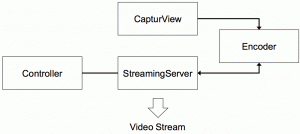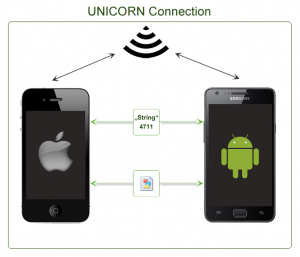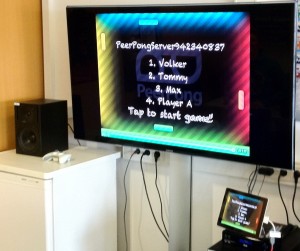The following projects were realized in the course of the lecture on Mobile Applications in the winter term 2011/12:
- iOS Terminal Mode Application
- Cross-Plattform Hessian Framework: Unicorn
- Mobile App Guidebook on Berlin (in cooperation with a large local publishing company)
- Remote Flashconfigurator (in cooperation with a large local car manufacturer)
iOS Terminal Mode Application

The goal of this project was to implement a terminal mode server for iOS devices. The idea was to capture the screen of the device, encode it as a video stream and send it to the client. On the client side any video streaming client such as VLC can be used. The goal was achieved and the result show the feasibility of the idea.
The resulting application still has to be optimized in performance and picture quality but nevertheless the students did an enormously good job in implementing an application like this in as little time as a semester.
Cross-Plattform Hessian Framework: Unicorn

Unicorn is a framework based on the Hessian Protocol allowing to transmit arbitrary objects between mobile devices running different operating systems via WLAN. In the Mobile Applications course this winter term 2011/12 four students (Volker Tietz, Thomas Fankhauser, Moritz Haarmann und Max Batt) implemented this framework for iOS and Android. You can find the code here on GitHub. Using Unicorn it is possible to develop cross-platform applications exchanging data in real-time using WLAN. Examples are multi-player games or chat applications.

In order to test their implementation the students developed a multi-player game called PeerPong which is based on the classical Pong game. In this game an iPad is used as the game server. Other mobile devices runs the PeerPong Controller App, allowing to take part as a player in this real time multi-player game. The controller App runs on both, Android and iOS devices. The game uses the Unicorn framework to transmit game objects, such as the player name and position of the controller in real-time. Four players can take part in a game session at a time. The game can be found here on GitHub.
Mobile App Guidebook “My Berlin” (Mein Berlin)
Remote Flash-Configurator
In cooperation with a large local car manufacturer, the students (Wolfgang Borst, Philipp Krähmer, Christoph Wendt, Christian Mahler) developed a mobile application to configure remote flash jobs for vehicles in order to update the software versions of embedded controllers in the vehicle remotely.
Two versions of the application were developed. One was natively developed for iOS, the other one as a mobile web application using Sencha Touch.
Both versions were compared on performance and usability. The result was that on iOS the mobile web version running in mobile Safari was very useful. On Android devices the performance was quite bad and the app could not be compared to a native implementation. The native iOS implementation made a better impression regarding performance and usability but the development time it took was much higher compared with the mobile web implementation. Thus the functionality of the iOS version had to be reduced in order to get a version ready before end of the semester.

